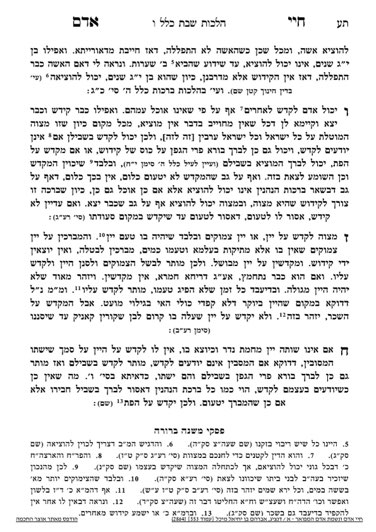The current series, which will cover Maariv on Friday night and Kiddush, is available for sponsorship. Please contact Rabbi Reingold for more information.
We are continuing in siman 6, discussing the idea that while one can normally be motzi others, it does not apply to birchas hanehenin. That being said, it does apply to birchos hanehenin which are recited in conjunction with mitzvos. One example is the borei pri hagafen of kiddush. The intent of the person making the bracha is to say kiddush on wine. Chazal understood that holding the cup is not enough of an indication that one is making kiddush on the wine, but rather the person making kiddush must make a bracha on the wine. Hence, Beis Shammai holds that borei pri hagafen should be recited at the end of kiddush, for if it were to be recited earlier, it would be a hefsek between the birchas hanehenin and drinking. However, Beis Hillel holds that borei pri hagafen is made at the beginning of kiddush, to indicate that kiddush is being made on wine. The bracha of borei pri hagafen serves to facilitate the mitzvah, and becomes part of the mitzvah process. We pasken in accordance with Beis Hillel.
This idea applies to kiddush on Shabbos morning as well, because Chazal instituted that before a person begins a meal of chashivus, they should indicate it by beginning the meal with a cup of wine.
Thus, the reason one can be motzi another, even if they were already yotzei or are not joining in the seudah, is because the birchas hanehenin (borei pri hagefen) serves to facilitate the birchas hamitzvah (kiddush), so it is all considered a birchas hamitzvah.
We know that if a person does not have wine, they can make kiddush on bread. The Chayei Adam adds that one can be motzi others in kiddush when they are making kiddush over bread as well. One can be motzi others even if they are not eating any of the hamotzi at all, similar to how one is motzi others with kiddush on wine even though they are not drinking anything at all.
The Chayei Adam clarifies that the motzi and yotzei have to have in mind to be yotzei. There are two explanations as to why. The first, brought in the Beis Yosef, is that this point is just another part of the concept of mitzvos tzrichos kavanah. A mitzvah must be done with intent, both for the one executing the mitzvah and the one who will benefit from it. (See more about mitzvos tzrichos kavanah in shiurim 1413-1420)
The Rashba brings another explanation. He writes that in order to share dibbur (speech) with another person, it requires that the person speaking has intent to share it with the other, and the other has intent to share it with the person speaking. Thus, it is not a point related to mitzvos tzrichos kavanah, but it is integral to the process of shomeah k’oneh.
The practical difference between these two explanations is that according to the Beis Yosef, in cases where we do not require mitzvos tzrichos kavanah, there is no need for the extra kavanah. According to the Rashba, this extra kavanah is always required, because it is integral to the process of shomeah k’oneh.
The Chayei Adam repeats that when it comes to most birchos hanehenin, one cannot be motzi another person. Over here, since the purpose of borei pri hagafen is to facilitate kiddush, it is considered a birchas hanehenin, and one can be motzi someone else. On the flip side, this means that the person making kiddush without intention to be yotzei is not allowed to drink or eat anything until he makes kiddush with the intention to be yotzei.
Summary
- One can be motzi another in a mitzvah, provided that both the motzi and yotzei have the same level of mitzvah obligation.
- However, one can not be motzi another in birchas hanehenin, unless they are both eating and are in a state of kevius together. That will include being seated together, intending to eat together, etc.
- Although kiddush includes a borei pri hagafen, it is considered a birchas hamitzvah, and one can be motzi another person in kiddush.
- One can be motzi another person even if the motzi himself does not plan to be yotzei kiddush himself.



